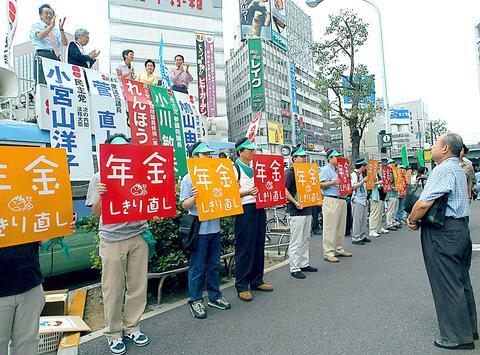Japan's ruling and opposition party chiefs made their final appeals to voters yesterday, a day before an election that could determine the fate of Prime Minister Junichiro Koizumi.
Koizumi's ruling coalition cannot be ousted from power as a result of the election for parliament's upper house, as it holds a majority in the powerful lower chamber.
But a poor showing in elections for the upper chamber would weaken his clout and might invite calls for his resignation.

PHOTO: AP
Koizumi, his voice hoarse on the final day of the election campaign, urged scores of voters who were gathered in Tokyo's Ginza shopping district despite pouring rain, to vote for his Liberal Democratic Party (LDP).
Yasunori Yamazaki, a 31-year-old computer engineer who stopped to listen to LDP members stump as he was passing by, said he was undecided but leaning toward voting for the ruling party.
"If you look at Japanese politics up to Koizumi, Koizumi is so much better," Yamazaki said.
Such support would be welcome for Koizumi and his party in what could be a tightly contested elec-tion. A survey published by the Asahi Shimbun daily on Friday showed that voters were about evenly split between the LDP and the main opposition Democratic Party.
The LDP appeared to have recovered some ground from previous polls, but the survey was largely in line with those released earlier this week showing that it was in danger of falling short of its goal of winning 51 of the 121 seats being contested.
The upper chamber has a total of 242 seats, with elections for half of them held every three years.
If the LDP performed poorly and won only 44 seats, that would almost certainly force Koizumi to step down, analysts say.
While Koizumi stumped in the urban centers of Osaka and Tokyo, Katsuya Okada, the leader of the main opposition Democratic Party, spent the day in southwestern Japan, seeking to bolster support in closely-fought rural districts where his party has been weak.
Friday's emotional reunion of a Japanese woman abducted by North Korea decades ago with the US ex-soldier she married and had to leave behind in Pyongyang when she came home in 2002 just might tip the scale toward the LDP.
Japanese media gave heavy coverage to the Jakarta reunion of Hitomi Soga with Charles Robert Jenkins and their two daughters, and some voters might credit Koizumi with making it possible.
That would be a welcome relief for Koizumi, whose party has been on the defensive over public dissatisfaction toward pension reforms.
Also See Story:
Alleged deserter spends first day outside N Korea

Conflict with Taiwan could leave China with “massive economic disruption, catastrophic military losses, significant social unrest, and devastating sanctions,” a US think tank said in a report released on Monday. The German Marshall Fund released a report titled If China Attacks Taiwan: The Consequences for China of “Minor Conflict” and “Major War” Scenarios. The report details the “massive” economic, military, social and international costs to China in the event of a minor conflict or major war with Taiwan, estimating that the Chinese People’s Liberation Army (PLA) could sustain losses of more than half of its active-duty ground forces, including 100,000 troops. Understanding Chinese

The Ministry of Foreign Affairs (MOFA) yesterday said it is closely monitoring developments in Venezuela, and would continue to cooperate with democratic allies and work together for regional and global security, stability, and prosperity. The remarks came after the US on Saturday launched a series of airstrikes in Venezuela and kidnapped Venezuelan President Nicolas Maduro, who was later flown to New York along with his wife. The pair face US charges related to drug trafficking and alleged cooperation with gangs designated as terrorist organizations. Maduro has denied the allegations. The ministry said that it is closely monitoring the political and economic situation

UNRELENTING: China attempted cyberattacks on Taiwan’s critical infrastructure 2.63 million times per day last year, up from 1.23 million in 2023, the NSB said China’s cyberarmy has long engaged in cyberattacks against Taiwan’s critical infrastructure, employing diverse and evolving tactics, the National Security Bureau (NSB) said yesterday, adding that cyberattacks on critical energy infrastructure last year increased 10-fold compared with the previous year. The NSB yesterday released a report titled Analysis on China’s Cyber Threats to Taiwan’s Critical Infrastructure in 2025, outlining the number of cyberattacks, major tactics and hacker groups. Taiwan’s national intelligence community identified a large number of cybersecurity incidents last year, the bureau said in a statement. China’s cyberarmy last year launched an average of 2.63 million intrusion attempts per day targeting Taiwan’s critical

AGING: As of last month, people aged 65 or older accounted for 20.06 percent of the total population and the number of couples who got married fell by 18,685 from 2024 Taiwan has surpassed South Korea as the country least willing to have children, with an annual crude birthrate of 4.62 per 1,000 people, Ministry of the Interior data showed yesterday. The nation was previously ranked the second-lowest country in terms of total fertility rate, or the average number of children a woman has in her lifetime. However, South Korea’s fertility rate began to recover from 2023, with total fertility rate rising from 0.72 and estimated to reach 0.82 to 0.85 by last year, and the crude birthrate projected at 6.7 per 1,000 people. Japan’s crude birthrate was projected to fall below six,